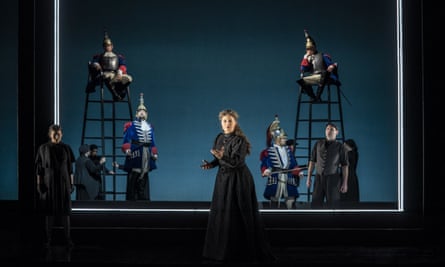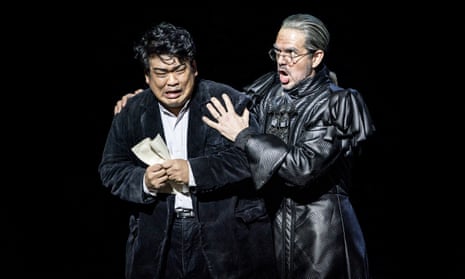Giuseppe Verdi’s determination to conquer Paris with a grand opera that fulfilled the requisites of French convention just about paid off: its first performance in 1855 was a modest success. Grand and, at three-and-a-half hours, a long haul, Les Vêpres Siciliennes requires a parallel determination on the part of today’s audience – not least in getting to grips with a story rooted in an actual historical event: the Sicilian massacre of their French oppressors. But Verdi is core to the Welsh National Opera’s tradition and with this production – the last in the trilogy undertaken over three seasons by director David Pountney and conductor laureate Carlo Rizzi – they honour his intentions nobly.
Insisting on the composer’s advances in creating musical drama that’s both imposing and intimate, Pountney and Rizzi also uphold the integrity of the French operatic experience that demanded ballet as part of the opera, by involving National Dance Company Wales. Rather than interpolated as mere divertissement, their dances – contemporary rather than balletic in style – enact the backstory of Sicilian freedom-fighter Henri, conceived when his mother is raped by Guy de Montfort, the Frenchman who becomes the island’s brutal governor. Learning that this man is his father appals Henri, and it is the confrontation of the two men, the collision of agonising political and emotional considerations, that Verdi conjures most brilliantly. It is indeed in their central duet and those between Henri and his beloved Hélène that the music is at its most intense; together with highly charged choruses, the WNO forces are here at their customary best.

Yet it is the elegant choreography of the three massive black frames – the design’s common denominator with the other two operas in the trilogy, La Forza del Destino and Un Ballo in Maschera – that defines the look of this staging. The time frame is more complicated: the colourful uniforms and helmets of second empire French dragoons are offset by plain 20th-century black for the oppressed Sicilians, Henri among them. The disparity between him and Hélène, who is in 19th-century dress, her black also signifying mourning for the brother whose murder she must avenge, is a hint that their union will not come about. Verdi’s propensity for portraying timeless tragedy runs deep.
There is some self-conscious recycling from the earlier two shows, but the starkly black feel, in which the lighting reflects the atmospheric orchestral writing, is the most effective – if unrelenting – of the trilogy. It is the voices that disappoint. As Henri, tenor Jung Soo Yun has undeniable vocal stamina; his French is the most comprehensible, but the sound is too shouty and hard. His encounter with Giorgio Caoduro’s rather uneven De Montfort has passion, while Wojtek Gierlach as Jean Procida was too wooden to ignite the mission to free his native Sicily. The Armenian soprano Anush Hovhannisyan expressed well the tortured dilemma of Hélène, but her big stage presence contrasts with rather too small a voice – although, by the last scene, she was firing on all cylinders and more credibly prompting the opera’s violent denouement.
It is thanks to Rizzi in the pit that Verdi’s combination of power and finesse gives the ear much to savour, and there is theatricality and spectacle aplenty. But, without the thrill of major singers, this final part of the trilogy is inevitably less convincing than the previous two.
At Wales Millennium Centre, Cardiff, until 22 February, then touring until 9 May.

Comments (…)
Sign in or create your Guardian account to join the discussion